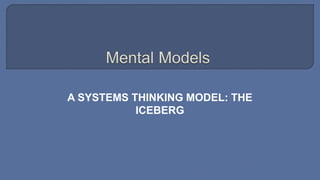Mental models short
•Download as PPTX, PDF•
0 likes•76 views
Mental Models wrt Conceptual thinking
Report
Share
Report
Share

Recommended
Recommended
More Related Content
Similar to Mental models short
Similar to Mental models short (20)
The beer game - a production distribution simulation

The beer game - a production distribution simulation
Magazine Design Sample: System Oriented Leadership

Magazine Design Sample: System Oriented Leadership
pdfcoffee.com_q3-business-ethics-12-module-5-pdf-free.pdf

pdfcoffee.com_q3-business-ethics-12-module-5-pdf-free.pdf
Anti-Racism Training: Exploring Systemic Racism with Systems Thinking

Anti-Racism Training: Exploring Systemic Racism with Systems Thinking
Complexadaptivesystemstheory 12613245196525-phpapp02

Complexadaptivesystemstheory 12613245196525-phpapp02
Sociology - A new way to think part 2 methods rev 9-10-18

Sociology - A new way to think part 2 methods rev 9-10-18
More from Jai Chenna
More from Jai Chenna (16)
Recently uploaded
Recently uploaded (20)
21st_Century_Skills_Framework_Final_Presentation_2.pptx

21st_Century_Skills_Framework_Final_Presentation_2.pptx
Simple, Complex, and Compound Sentences Exercises.pdf

Simple, Complex, and Compound Sentences Exercises.pdf
On National Teacher Day, meet the 2024-25 Kenan Fellows

On National Teacher Day, meet the 2024-25 Kenan Fellows
dusjagr & nano talk on open tools for agriculture research and learning

dusjagr & nano talk on open tools for agriculture research and learning
Exploring_the_Narrative_Style_of_Amitav_Ghoshs_Gun_Island.pptx

Exploring_the_Narrative_Style_of_Amitav_Ghoshs_Gun_Island.pptx
HMCS Vancouver Pre-Deployment Brief - May 2024 (Web Version).pptx

HMCS Vancouver Pre-Deployment Brief - May 2024 (Web Version).pptx
QUATER-1-PE-HEALTH-LC2- this is just a sample of unpacked lesson

QUATER-1-PE-HEALTH-LC2- this is just a sample of unpacked lesson
Beyond_Borders_Understanding_Anime_and_Manga_Fandom_A_Comprehensive_Audience_...

Beyond_Borders_Understanding_Anime_and_Manga_Fandom_A_Comprehensive_Audience_...
NO1 Top Black Magic Specialist In Lahore Black magic In Pakistan Kala Ilam Ex...

NO1 Top Black Magic Specialist In Lahore Black magic In Pakistan Kala Ilam Ex...
Mental models short
- 1. A SYSTEMS THINKING MODEL: THE ICEBERG
- 3. Systems thinking is a way of approaching problems that asks how various elements within a system — which could be an ecosystem, an organization, or something more dispersed such as a supply chain — influence one another. Rather than reacting to individual problems that arise, a systems thinker will ask about relationships to other activities within the system, look for patterns over time, and seek root causes. One systems thinking model that is helpful for understanding global issues is the iceberg model. We know that an iceberg has only 10 percent of its total mass above the water while 90 percent is underwater. But that 90 percent is what the ocean currents act on, and what creates the iceberg’s behavior at its tip. Global issues can be viewed in this same way.
- 5. The event level is the level at which we typically perceive the world—for instance, waking up one morning to find we have caught a cold. While problems observed at the event level can often be addressed with a simple readjustment, the iceberg model pushes us not to assume that every issue can be solved by simply treating the symptom or adjusting at the event level.
- 6. If we look just below the event level, we often notice patterns. Similar events have been taking place over time — we may have been catching more colds when we haven’t been resting enough. Observing patterns allows us to forecast and forestall events.
- 7. Below the pattern level lies the structure level. When we ask, “What is causing the pattern we are observing?” the answer is usually some kind of structure. Increased stress at work due to the new promotion policy, the habit of eating poorly when under stress, or the inconvenient location of healthy food sources could all be structures at play in our catching a cold. According to Professor John Gerber, structures can include the following:
- 8. 1. Physical things — like vending machines, roads, traffic lights or terrain. 2. Organizations — like corporations, governments, and schools. 3. Policies — like laws, regulations, and tax structures. 4. Ritual — habitual behaviors so ingrained that they are not conscious.
- 9. Mental models are the attitudes, beliefs, morals, expectations, and values that allow structures to continue functioning as they are. These are the beliefs that we often learn subconsciously from our society or family and are likely unaware of. Mental models that could be involved in us catching a cold could include: a belief that career is deeply important to our identity, that healthy food is too expensive, or that rest is for the unmotivated.
